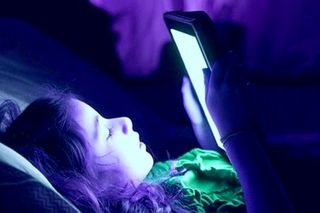
Screen Time Doesn’t Impact the Quality of Kids’ Sleep, Study Says
Early school start times are probably a bigger obstacle to children’s sleep.

Anxiety about screen time, and its effects on children’s health and emotional well-being, has come to define parenting in a digital age. Concerns range from the physical — that screens are creating more sedentary, inactive lifestyles — to the psychological — that kids in a constant cycle of digital communication feel more depressed and anxious than those engaging socially offline. One other big concern about screens is the effect of their addictiveness, and the blue light they emit, on children’s sleep patterns. However, new research from the Oxford Internet Institute at the University of Oxford, has shown that screen time has very little practical effect on children’s sleep.
The study, published in the Journal of Pediatrics, was conducted using data from the United States’ 2016 National Survey of Children’s Health. Parents from across the country completed self-report surveys on themselves, their children and household.
“The findings suggest that the relationship between sleep and screen use in children is extremely modest,” says Professor Andrew Przybylski, author of the study. “Every hour of screen time was related to 3 to 8 fewer minutes of sleep a night.”
In practical terms, while screen time does have an impact on children’s sleep patterns, it might be too small to make a significant difference to a child’s sleep. Other known factors, such as early starts to the school day, have a larger effect on childhood sleep.
Article continues below
“This suggests we need to look at other variables when it comes to children and their sleep,” says Przybylski. Analysis in the study indicated that variables within the family and household were significantly associated with both screen use and sleep outcomes. “Focusing on bedtime routines and regular patterns of sleep, such as consistent wake-up times, are much more effective strategies for helping young people sleep than thinking screens themselves play a significant role.”
The aim of this study was to provide parents and practitioners with a realistic foundation for looking at screen versus the impact of other interventions on sleep. Being able to set aside screen time as a major culprit means that we can focus on exploring the other behaviors within households that may be leading children to experience less than ideal sleep patterns.
“The next step from here is research on the precise mechanisms that link digital screens to sleep. Though technologies and tools relating to so-called ‘blue light’ have been implicated in sleep problems, it is not clear whether play a significant causal role,” says Przybylski. The more we know about what roles screen play — or don’t play — in our well-being, the better we can frame children’s healthy engagement with the digital world.
Related


Helping a Teen Who Self‑Harms Can Be a Long, and Common, Journey
